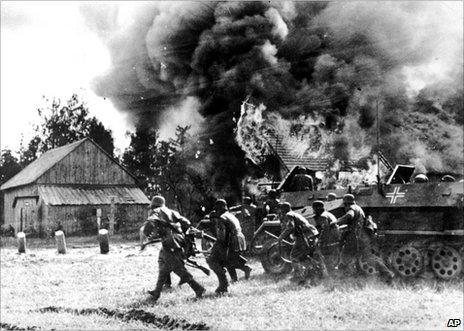Barbarossa Hitler Stalin: War warnings Stalin ignored
- Published

Russia and other parts of the former USSR commemorate one of the darkest days of their history on Wednesday, the 70th anniversary of Hitler's invasion.
It has long been known that Stalin received warnings of an impending attack, prompting one of the great questions of military history: why were Soviet forces, despite their impressive numbers, so ill-prepared to withstand the Nazi blitzkrieg?
Some accounts of the war have sought to play down the amount of intelligence the Kremlin had to go on, but this week a wealth of damning detail has emerged in the Russian media.
In an interview with Komsomolskaya Pravda newspaper, Russian military historian Arsen Martirosyan revealed that Soviet intelligence had named the exact, or almost exact, date of the invasion 47 times in the 10 days before Germany struck.
Moscow knew of Nazi invasion plans from 1935, the historian argues, and was aware as early as 1936 of an attack plan called the Eastern Campaign.
It seems that Hitler himself all but let the cat out of the bag in May 1941, when he sent a letter to Stalin, who at the time was still a nominally friendly leader under the Molotov-Ribbentrop non-aggression pact.
According to Martirosyan, the Fuehrer notified the Vozhd of his plans to "redeploy his troops from the German-Soviet frontier to the west between 15 and 20 June approximately". Substitute "east" for "west", and you get the picture...
Border reports
Ordinary Soviet border guards passed on most of the warnings of the coming invasion, Martirosyan said.
Between 1 and 10 June, they captured 108 enemy spies and saboteurs, he told Komsomolskaya Pravda, and a further 200 or so in the final 12 days before the invasion.
On 14 June, guards on the Belarusian section of the border relayed back to Moscow the correct date of the planned invasion, learnt from two captured saboteurs. The same date was revealed by saboteurs captured on 18 June.
Border guard agents operating on the German-controlled side of the border also confirmed the date repeatedly, Martirosyan found, as did local civilians.
Most poignantly, perhaps, were the Polish women who gathered on the opposite bank of one frontier river on 15 June, cupping their hands around their mouths to shout warnings, in broken Russian, to the Soviet guards facing them.
"Soviets, Soviets, the war is coming!" they were recorded as saying. "Soviets, the war will start in one week!"
Only on 18 June did Stalin order aerial reconnaissance missions to be conducted along the USSR's western borders.
Flying 400km (250 miles) from south to north, one pilot, Air Maj-Gen Georgy Zakharov, reported seeing "frontier regions west of the state border packed with troops... tanks, armoured cars and guns poorly concealed or not concealed at all... roads criss-crossed by motorcycles and what appeared to be staff cars".
Barbarossa, as the Nazis code-named the invasion, was just days away, and with it the start of a devastating new phase of World War II which claimed more than 20 million Soviet lives.
Stalin's leadership
Martirosyan argues that Stalin held back because of a lack of reliable evidence of the coming attack, and had legitimate concerns about deliberate misinformation by German intelligence.
Indeed, the historian is known for seeking to defend Stalin's war record.
A former agent in the KGB's foreign intelligence service, he is author of such works as Two Hundred Myths About Stalin, and The Marshals' Plot - British Intelligence Against The USSR.
Yet his latest research suggests a catalogue of missed opportunities by the Soviet high command, and revives questions about Stalin's competence as a military leader, at least in the early stages of the war on the Eastern Front.
The old debate about whether the USSR prevailed against Hitler because of the dictator's leadership, or in spite of it, refuses to go away.